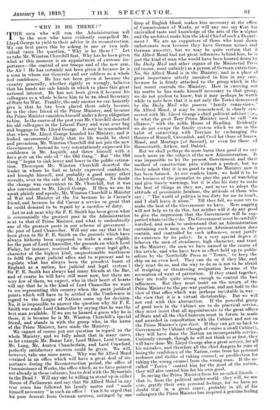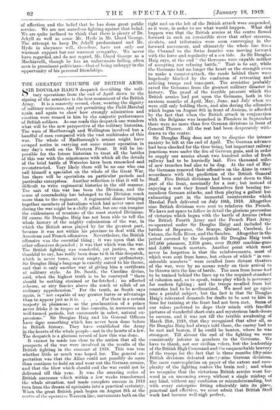"WHY IS HE THERE ? "
ripHE men who will run the Administration will be the men who have evidently compelled Mr.
Lloyd George to yield to their advice in its reconstruction. We can best prove this by asking in one or two indi- vidual cases the question, " Why is he there 1 " Let us take Mr. Winston Churchill first. Why has he been given what at this moment is an appointment of extreme im- portance—the control of our troops and of the new arm, the Air He has certainly not been given it because he is a man in whom our Generals and our soldiers as a whole feel confidence. He has not been given it because the country generally, whether rightly or wrongly, believes that his hands are safe hands in which to place this great national interest. He hie not been given it because his colleagues as a whole believe him to be an ideal Secretary of State for War. Frankly, the only answer we can honestly give is that he has been placed there solely because he is the close friend of the Prime Minister, and because the Prime Minister considers himself under a deep obligation to him. In the course of the past year Mr. Churchill deserted his old colleagues in the liberal Party and went over bag and baggage to Mr. Lloyd George. It may be remembered that when Mr. Lloyd George founded his Ministry, and it looked uncommonly likely that its life would be short and precarious, Mr. Winston Churchill did not join the new Government. Instead he very ostentatiously expressed his confidence in Mr. Asquith, and threw himself with a beau ge4e on the side of " the Old Gang." But " the Old Gang " began to sink lower and lower in the public estima- tion. Thereupon Mr. Winston Churchill deserted the leader in whom he had so lately expressed confidence, and brought himself, and probably a good many other recruits, over to the side of Mr. Llovd George. No doubt the change was convenient to Mr. 'Churchill, but it was also convenient to Mr. Lloyd George. If then we are to speak plainly and openly, Mr. Winston Churchill is Minister of War and Minister of the Air because he is Caesar's friend, and because he did Caesar a service so great that he could demand to be repaid by a sacrifice of duty.
Let us ask next why Sir F. E. Smith has been given what is ceremonially the greatest post in the Administration next to that of Prime Minister, and what is undoubtedly one of the greatest posts in our scheme of goverment— the post of Lord Chancellor. Will any one say that it has been given to Sir F. E. Smith on the grounds which have always hitherto been supposed to make a man eligible for the post of Lord Chancellor, the grounds on which Lord Finlay, for instance, received the office—great legal gifts, character of the highest kind, unquestionable worthiness to fulfil the great judicial office and to represent and to regulate what has always been the proudest boast of England as a nation, her judicial and legal system ? Sir F. E. Smith has always had many friends at the Bar, and of course he will have still more now, but there are very few of them, we expect, who in their heart of hearts will say that he is the kind of Lord Chancellor we want to see representing this country when the great juridical points which will have to he settled at the Conference in regard to the League of Nations come up for decision. No, it is impossible to answer the question why Sir F. E. Smith was made Lord Chancellor by saying that be was the best man available. If we arc to hazard a guess why he is there, it is because he is Mr. Winston Churchill's special friend, and stands in with the group who, in the JAMB of the Prime Minister, have made the Ministry. ' • We cannot of course put our question in regard to the whole Ministry, and we fully admit that in many eases, as for example Mr. Bonar Law, Lord Miner, Lord Curzon, Mr. Long, Mr. Austen Chamberlain, and Lard Crawford, perfectly satisfactory answers could be given. We will, hoWever, take one more name. Why was Sir Alfred Mond retained in an office which will have a great deal of im- portance during the Reconstruction period, the office of Commissioner of Works, the office which, as we have pointed out already in these colunins, has to deal with the Memorials
to the Dead Will any one be willing to stand up in either House of Parliament and say that Sir Alfred Mond in any true sense has followed. his family motto and made hiniself necessary " in such an office ? Can it be urged that his pure descent from German sources, untinged by one drop of English blood, makes him necessary at the office of Commissioner of Works, or will any one say *bat his unrivalled taste and knowledge of the arts of the a.ulptor and the architect make him the ideal Chief of such a Depart- ment ? We are no supporters of those who hunt down unfortunate men because they have German names and German ancestry, but we may be quite certain that if Sir Alfred Mond had not great influences behind him, he is just the kind of man who would have been hunted down by
the Daily Mail and other organs of the Ministerial Press (of course, most unfairly) as a.person of German extraction.
No, Sir Alfred Mond is in the Ministry, and in a place of
great importance utterly unsuited to hint in any case, because lie is firmly attached to the group which in the
last resort controls the Ministry. How in carrying out his motto he has made himself necessary to that group, we do not profess to know, but it may perhaps be worth while to note here that it is not only the Tories denounced by the Daily Mail who possess "family connexions." Sir Alfred Mond, it may be remembered, is closely con- nected with Mr. Lloyd George's chief political adviser ; by what the great Tory Prime Minister used to call " an alliance," with the noble House of Reading. Evidently we do not escape the family system which we are in the habit of connecting with Toryism by exchanging the Houses of Russell, Cavendish, and Cecil for those of Isaacs, Mond, and Montagu [ea4 Samuel], or even for those of Harmsworth, Aitken, and Dalziel.
But we shall perhaps do more harm than good if we say much more on the subject of the new Administration. It was impossible to let the present Government and their method of construction pass without a protest., but we freely admit that it is no good to nag the Ministry now it has been formed. As our readers know, we hold it to be the business of the journalist to play the part of watchdog and give timely warnings, but it is also his duty to make the best of things as they are, and never to adopt the attitude of pessimistic fatalism, the attitude of those who say " The world of politics is too dirty for me to touch, and I shall leave it alone." Till they fall, we must try to make the best of the Government we have. Mere nagging will not help us to do this, but neither will it do any good to give the impression that the Government will be sup- ported whateverthey do. The Government must be carefully watched, and made to understand that an Administration containing such men as the present Administration does contain, and controlled by such influences, must justify its existence by its policy. In a very special degree it behoves the men of steadiness, high character, and trust in the Ministry, the men we have named in the course of this article, and who have been in effect held up to public odium by the Northcliffe Press as " Tories," to keep the ship on an even keel. They can do so if they like, and they must do so, and the way to do so is not to be afraid of resigning or threatening resignation because of the accusation of want of patriotism. If they stand together, they are really quite strong enough to control the bad influences. But they must insist on the return of the Prime Minister to the pm-war position, and not hold to the view of that office which was perhaps inevitable in war-- the view that it is a virtual dictatorship. But we will not end with this abstraction. If the powerful group of good men in the Cabinet are to do practical service, they must insist that all appointments to the great offices of State and all the chief honours must in future be made and awarded in consultation with the Cabinet and not on the Prime Minister's ipse diril. If they can get us back to Government by Cabinet (though of course a small Cabinet), they will have done the Nation an incomparable service. Curiously enough, though he will not think so at first, they will have done Mr. Lloyd George also a great service, for all his mistakes, and therefore all the chief dangers he runs of losing the confidence of the Nation, come from his personal rashness and dislike of taking counsel, or predilection for taking the wrong counsel from the wrong man. If the so- called " Tories " control him for the good of the nation, they will also control bins for his own good. In saving the Prime Minister from has so-called friends— that is front the political under-world—they will, we are sure, gratify their own personal feelings, for we have no doubt that in a great many, probably in all, of his colleagues the Prime Minister has inspired a genuine feeling of affection and the belief that he has done great public service. We are not ourselves fighting against that belief. We are quite inclined to think that there is plenty of Dr. Jekyll as well as some Mr. Hyde in Mr. Lloyd George. The attempt to keep Dr. Jekyll predominant and Mr. Hyde in abeyance will, therefore, have not only our warmest support but our warmest sympathy. We never have regarded, and do not regard, Mr. Lloyd George as a Machiavelli, though he has an unfortunate failing, often seen in prominent politician's—that of being unhappy in the opportunity of his personal friendships.



































 Previous page
Previous page